Retching, otherwise referred to as Dry heaving, is a reverse peristaltic movement of the esophagus and stomach without vomiting. When your dog retches, he’s performing vomiting actions, but not vomiting. Sometimes, retching precedes vomiting, while in others, retching may only cause a little amount of mucus or bile to be spewed.
You have nothing to worry about if your dog vomits occasionally and does not exhibit other symptoms. However, retching in dogs can indicate a significant underlying ailment. Several medical conditions can cause dog dry heaving; some of these conditions are life-threatening if there is no early treatment.
So, If your dog is retching, you must consider this an emergency and take them to the veterinary doctor immediately. In this article, we will be going over several reasons why your dog is retching and how you can solve the problem.
How Normal Is Vomiting In Dogs?
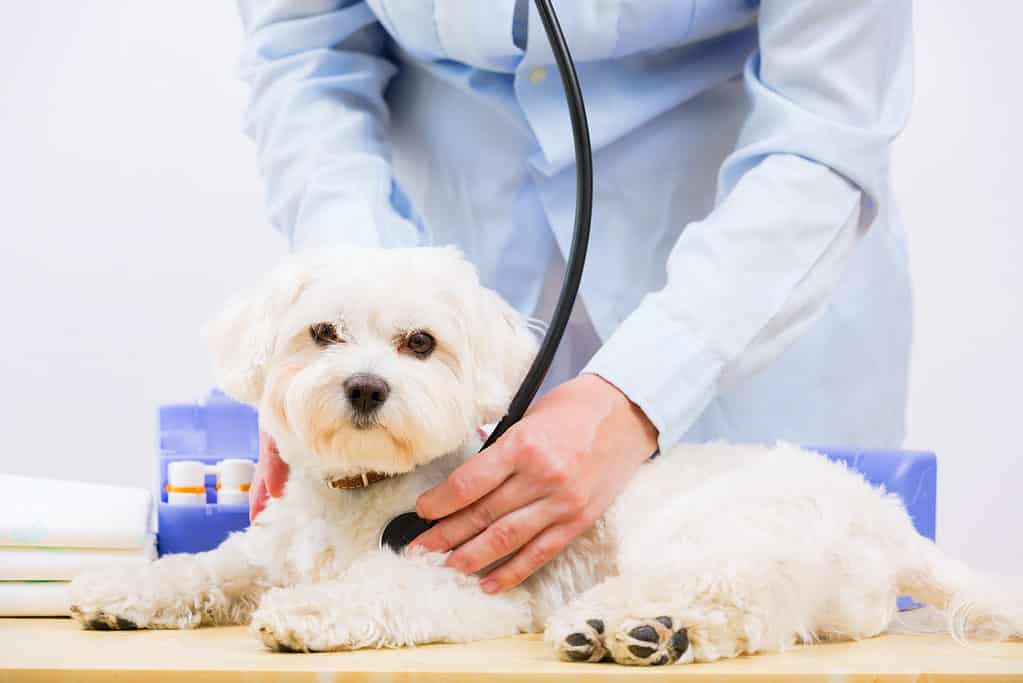
While vomiting is often a normal occurrence, it can also be a sign of more serious health issues. It is important to speak with a vet if vomiting or retching continues.
©gorillaimages/Shutterstock.com
Vomiting is a common occurrence in dogs, and while it can be alarming for pet owners, it is often a normal part of a dog’s digestive process. In fact, dogs may vomit for a variety of reasons, including eating too quickly, consuming something that does not agree with their stomach, or even as a response to stress.
However, while vomiting is often a normal occurrence, it can also be a sign of more serious health issues. Chronic vomiting, for example, can be a symptom of gastrointestinal diseases or other underlying health problems. Additionally, if a dog is vomiting frequently or experiencing other symptoms such as diarrhea or lethargy, it is important to seek veterinary care to determine the underlying cause.
There are steps pet owners can take to help prevent vomiting in their dogs. Feeding smaller, more frequent meals throughout the day, rather than one or two large meals, can help prevent stomach upset. Additionally, avoiding giving dogs table scraps or other foods that are high in fat or spices can help prevent digestive issues.
It is also important to make sure that dogs have access to clean water at all times, as dehydration can exacerbate vomiting and other health issues. If a dog is vomiting, it is important to make sure that they are still drinking water and staying hydrated.
Reasons Your Dog Is Retching
Dog dry heaving can be caused by medical and non-medical factors. These include:
Gastric Dilatation And Volvulus
Gastric dilatation and volvulus (GDV) is a medical condition in which the stomach is hyperextended and rotated due to extreme gas content. This condition affects dogs mainly. GDV is also known as gastric torsion. In plain terms, the stomach of the dog becomes stretched and twisted.
Some people call this condition “bloating.” However, in bloating, the stomach is only distended; there’s no twisting. Bloating is a normal phenomenon that occurs after eating. GDV is a critical condition that is fatal if there’s no medical intervention.
When the dog’s stomach expands and twists, its entrance and exit are blocked. The pressure that results from the twisting also cuts off blood supply to other vital organs.
Dogs with GDV dry-heave repeatedly to relieve their stomach of some of the trapped gas. Even then, the gases will not be released since the entrance to the stomach is blocked, so your dog keeps on retching. Other notable symptoms of GDV are increased heart rate, labored breathing, and an inflamed abdomen. Dogs with GDV require emergency surgery.
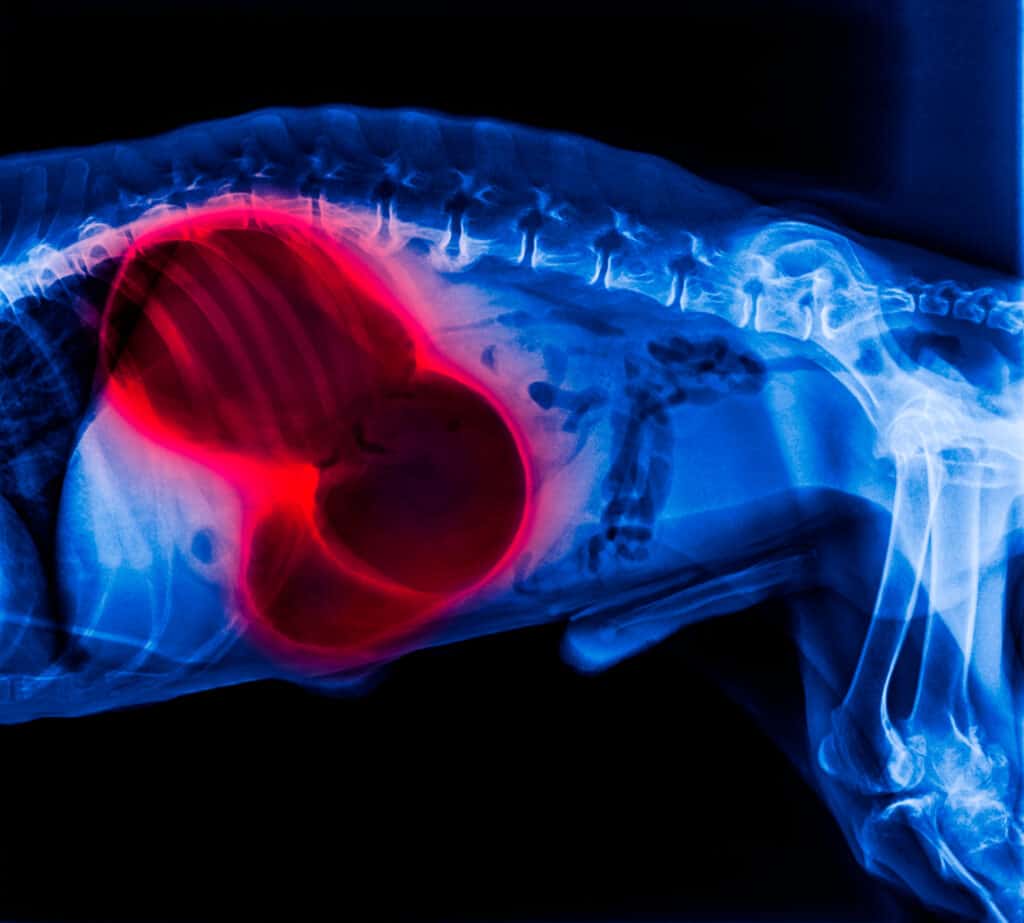
Gastric dilatation and volvulus (GDV) is a medical condition in which the stomach is hyperextended and rotated due to extreme gas content.
©Intarapong/Shutterstock.com
Blocked Throat
Another reason your dog is retching could be an object lodged in their esophagus or airways, causing a blockage. Your dogs can mistakenly swallow their dog toys, rocks, tissues, and other foreign objects. This can cause the dog to gag, retch, and even vomit.
Other things to look out for if you suspect an object is stuck in your dog’s throat are; pacing, mauling at the face, loud breathing sounds, and salivation. A dog trying to clear its blocked airway will produce dry-heaving coughs. Eventually, your dog might vomit the foreign object.
But in some cases, the object might be too deep, and dry heaving will be unproductive. It would be best to let a veterinary doctor remove the object; attempting to remove the object yourself can damage the esophageal lining of the dog.
Respiratory Disease
Various respiratory ailments can cause a dog to cough violently, leading to dog dry heaving. One of these diseases is Kennel Cough. Kennel cough is a respiratory infection that causes dogs to cough violently, causing them to dry heave. It is also known as canine infectious tracheobronchitis.
Kennel cough is an airborne disease caused by viruses and bacteria, especially Bordetella bacteria. If a dog infected with this airborne disease coughs into the air, any dog in its surrounding can contract it.
Kennel cough can easily be contracted at dog parks and dog groomers. Therefore you must inoculate your dog against kennel cough.
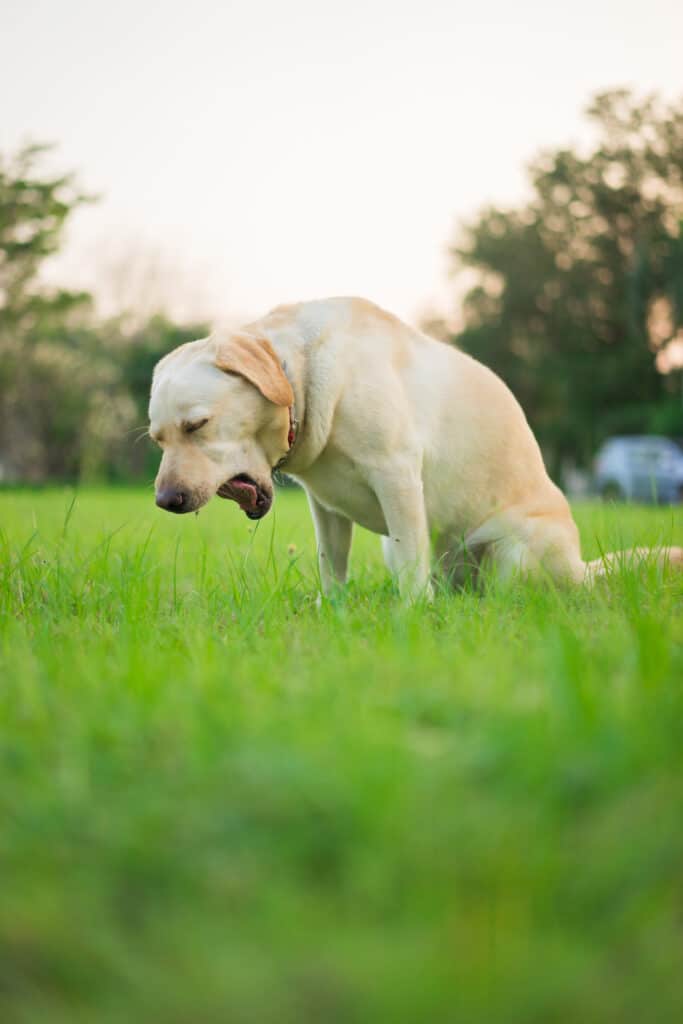
Kennel cough is an airborne respiratory illness in dogs that can cause retching as one of its symptoms.
©Dhanoo Surasarang/Shutterstock.com
Tumors Obstructing The Airways
Another medical condition that can cause retching in your dogs is a tumor growing in the esophagus or airways. When a tumor grows in your dog’s airways, it obstructs it. In addition to compressing the airways, it also compresses the esophagus.
These compressions due to abnormal growth can cause difficulty breathing. Irritation may occur, causing your dog to cough and dry heave to spew the irritant or make more room for air.
Surgical removal is the only way to get rid of these tumors in your dog’s throat.
Gobbling
Some dogs ingest their food quickly without adequately chewing or waiting for the previous bolus to go down. Ingesting food quickly can sometimes cause the food to go into the wrong channel. This can block the dog’s airways, causing them to dry-heave to get the food out.
Furthermore, dogs that eat quickly are susceptible to Gastric Dilatation and Volvulus. So if you observe that your dog is dry heaving while eating, this is probably what is happening. You can deal with this situation by getting a slow feeder which rations your dog’s meal.
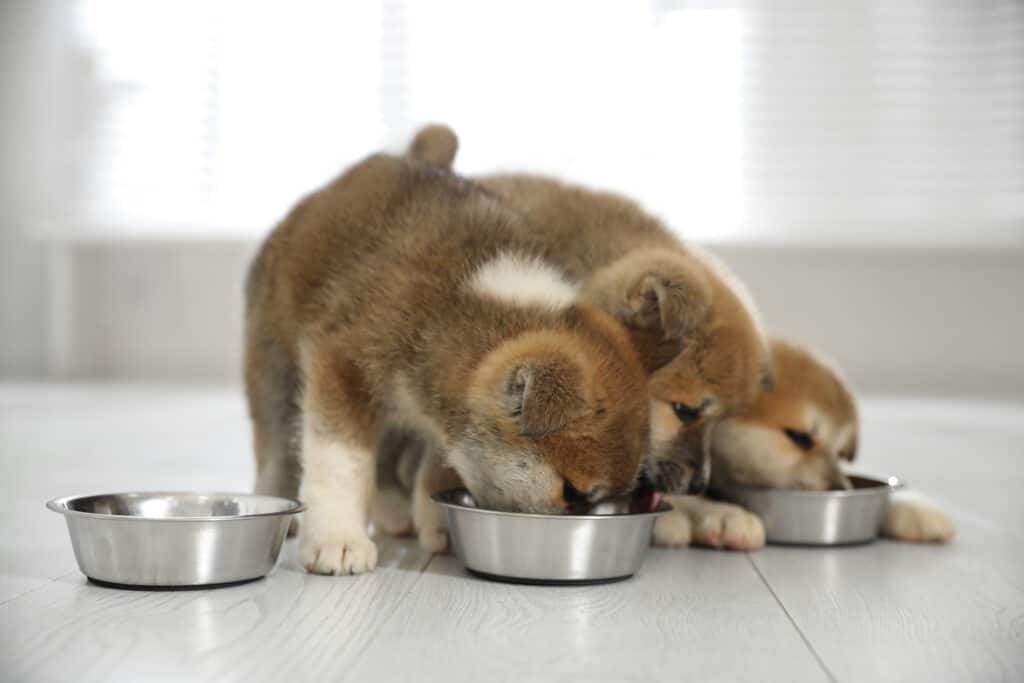
Sometimes dogs will eat too fast, causing food to go down the wrong channel in their throats.
©New Africa/Shutterstock.com
Nausea
Different things can make your dog feel nauseated. If your dog swallows a material that upsets his stomach, he may retch to vomit the unpleasant substance. Moreover, other normal daily activities such as eating excessive quantities of food, gobbling food, etc., can make your dog nauseated.
Also, certain drugs can cause nausea as a side effect, which can lead to dog dry heaving. Asides from nausea, ingesting unpleasant substances can lead to other problems, such as diarrhea, drooling, etc., in your dog.
Bilious Vomit
Bile is a yellowish-green fluid produced by the liver. Bile is essential for the complete digestion of food. During a prolonged fasting period in a dog, the stomach is empty. This means there’s nothing to neutralize the bile and gastric acids. This can lead to nausea and retching.
Bilious vomit is a result of excessive amassing of bile in the stomach. This irritates the walls of the stomach. If the dog still doesn’t eat, he starts to produce a fizzy yellow vomit. Other signs of bilious vomit are pale gums, dehydration, drooling, etc.
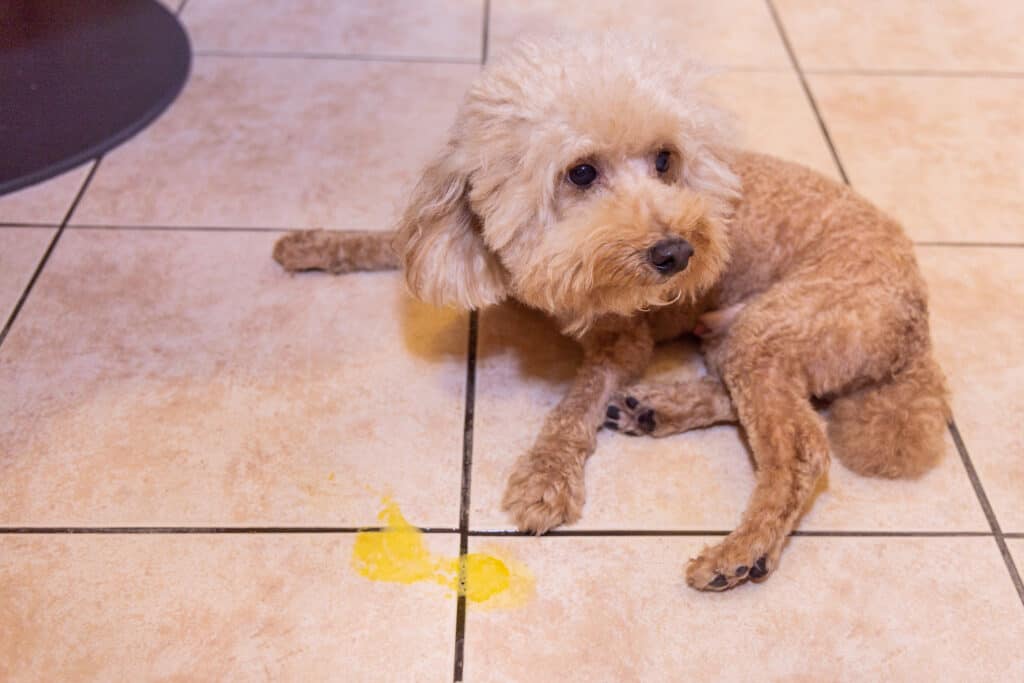
If a dog goes without food for too long excess bile will build up, leading to retching.
©ThamKC/Shutterstock.com
Loss Of Elasticity Of The Trachea
The trachea is a flexible respiratory pipe that conveys air to the lungs. It is commonly called the windpipe. The trachea is made up of cartilaginous rings that make it elastic.
In some dog breeds, such as Poodles, the cartilaginous rings that constitute the trachea weaken and reduce the diameter of the trachea. This condition is hereditary. When the trachea is constricted, severe coughing and retching can result.
Tonsillitis
Tonsillitis is a medical condition in which the tonsils are inflamed. This inflammation causes the tonsils to swell. When this lymphatic organ swells, it can initiate the dog’s gag reflex, causing it to dry heave.
How To Cure Retching In Dogs
Go To The Veterinary Doctor
Retching isn’t a minor issue that you can shove away; it requires immediate treatment. Inform your veterinarian of all signs you’ve observed. Tell whether the dog has vomited since it started retching or if the retching has not been productive. Also, provide information about what your dog has eaten recently.
The veterinarian will conduct physical examinations to check for anything that might help with the diagnosis. The vet also performs several chemical tests such as urinalysis, blood, etc. With the aid of imaging techniques, your vet might be able to pinpoint the exact cause of the retching.
The veterinarian will then carry out the appropriate treatment based on your dog’s condition. In the case of Gastric Dilatation and Volvulus (GVD), the vet needs to perform surgery on the dog without delay.
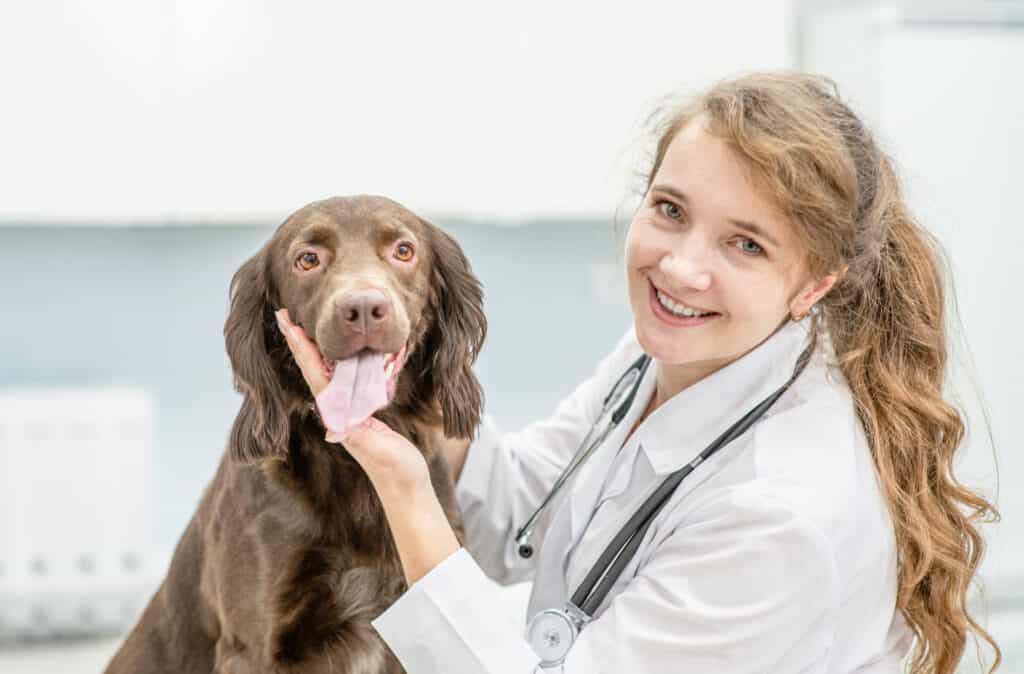
If you cannot figure out why your dog is retching, take him to the vet.
©Ermolaev Alexander/Shutterstock.com
For Kennel Cough
The first thing to do in this case is to isolate the infected dog because this infection is contagious. While they’re in isolation, these dogs can be treated with antibiotics, anti-inflammatory drugs, and cough suppressants.
For Bloating
Usually, simple bloat can be relieved when the dog belches or retches.
For Collapsed Windpipe
There’s no lasting cure for a collapsed trachea at the moment. The condition can only be managed with anti-inflammatories, bronchodilators, and cough suppressants. Obesity can aggravate this condition, so the dog’s weight should also be regulated. Surgery can also be effective but it is costly and many vets do not have the resources to perform this procedure.
How To Prevent Retching

To avoid retching, dogs should eat smaller amounts of food, multiple times per day.
©Africa Studio/Shutterstock.com
Bloating can be avoided by reducing the quantity of your dog’s meal. Your dog should eat a smaller amount of food, but multiple times. Food dispensers can help with this. Furthermore, gastropexy surgery, which forestalls your dog’s stomach from twisting, can mitigate your dog’s chances of coming down with GVD.
Moreover, you should ensure that your dog relaxes after every meal. This enables the food to settle well without any stress. Gastric torsion has been linked mainly with dogs that engage in bodily activities immediately after eating.
You can prevent your dog from contracting Kennel Cough by inoculating your dog with the bordetella vaccine. Also, it would help if you avoided congested dog kennels that lack adequate ventilation.
Also, place your dogs under close supervision so that they don’t swallow foreign objects, chew on inappropriate material, or ingest harmful substances. The best approach to prevent your dog from swallowing foreign objects is to dog-proof your house until you’re sure that your dog knows what he shouldn’t chew on.
Overall, a regular medical check-up for your dog is vital. This enables your veterinarian to examine your dog and possibly diagnose upcoming health issues, such as throat tumors, at an early stage.
Question: My dog is perfectly healthy and active – but she retches and vomits bile in the mornings. Her appetite is good. What can I do?
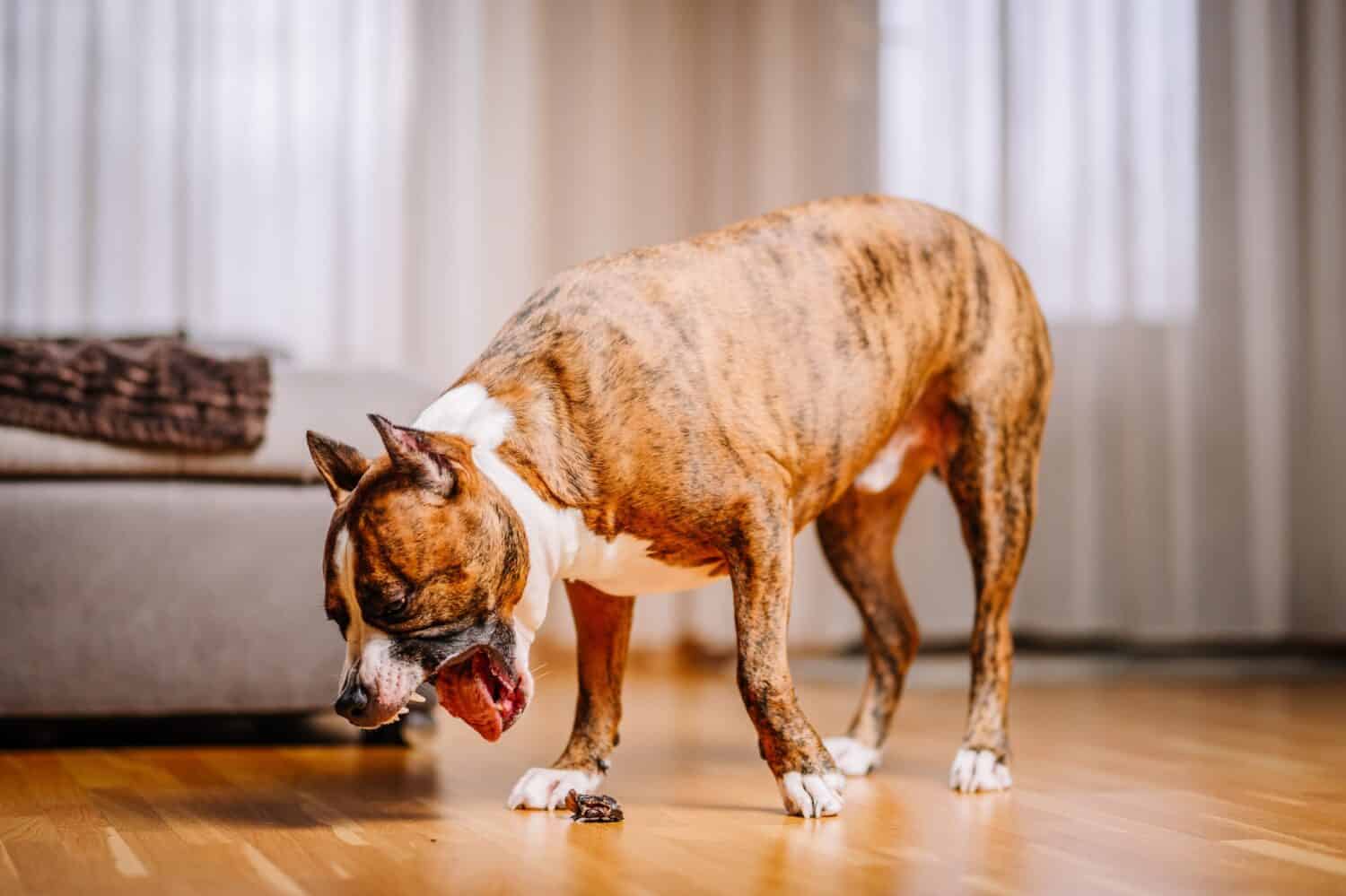
Some healthy dogs retch in the mornings because when they develop reflux gastritis.
Image: shulers, Shutterstock
©shulers/Shutterstock.com
Reflux Gastritis
It is distressing when your otherwise healthy dog suddenly begins retching upon waking on some mornings – producing a mix of fluid, mucus, and yellowish bile. After a period of recovery which may last an hour or so, she bounces back to her old self. She eats, poops, plays, barks at the mail person, and sits in your lap like always. Is it her food not agreeing with her? A thousand scenarios – most of them distressing – may run through your mind – and a trip to the vet may be in order. But, you may find that the answer isn’t so awful and the cure is easy. It may be time to switch the timing of your dog’s meals.
Reflux gastritis or bilious vomiting syndrome occurs when a dog’s stomach is empty for too long – after your dog has gone all night without eating. That is why they retch first thing in the morning. One theory as to why this happens is that something becomes amiss with the normal contractions of the gastrointestinal tract between meals – resulting in the fluid in the duodenum moving backwards into the stomach – causing irritation in the lining and vomiting. While the reason that dogs suddenly develop this problem is unknown the solution is usually a simple one – change the size and timing of their meals.
Feed your dog right before bedtime – or late in the evening – and first thing in the morning. That will prevent your sweet pup from going too long without food and should nip the problem in the bud! If this doesn’t work – you should definitely take your dog to your vet if you haven’t already. They will do a complete workup to make sure nothing else is wrong. If not, there are prescribed medications that you can give your dog to reduce gastric acidity or to help with the contractions of the small intestines.
Conclusion
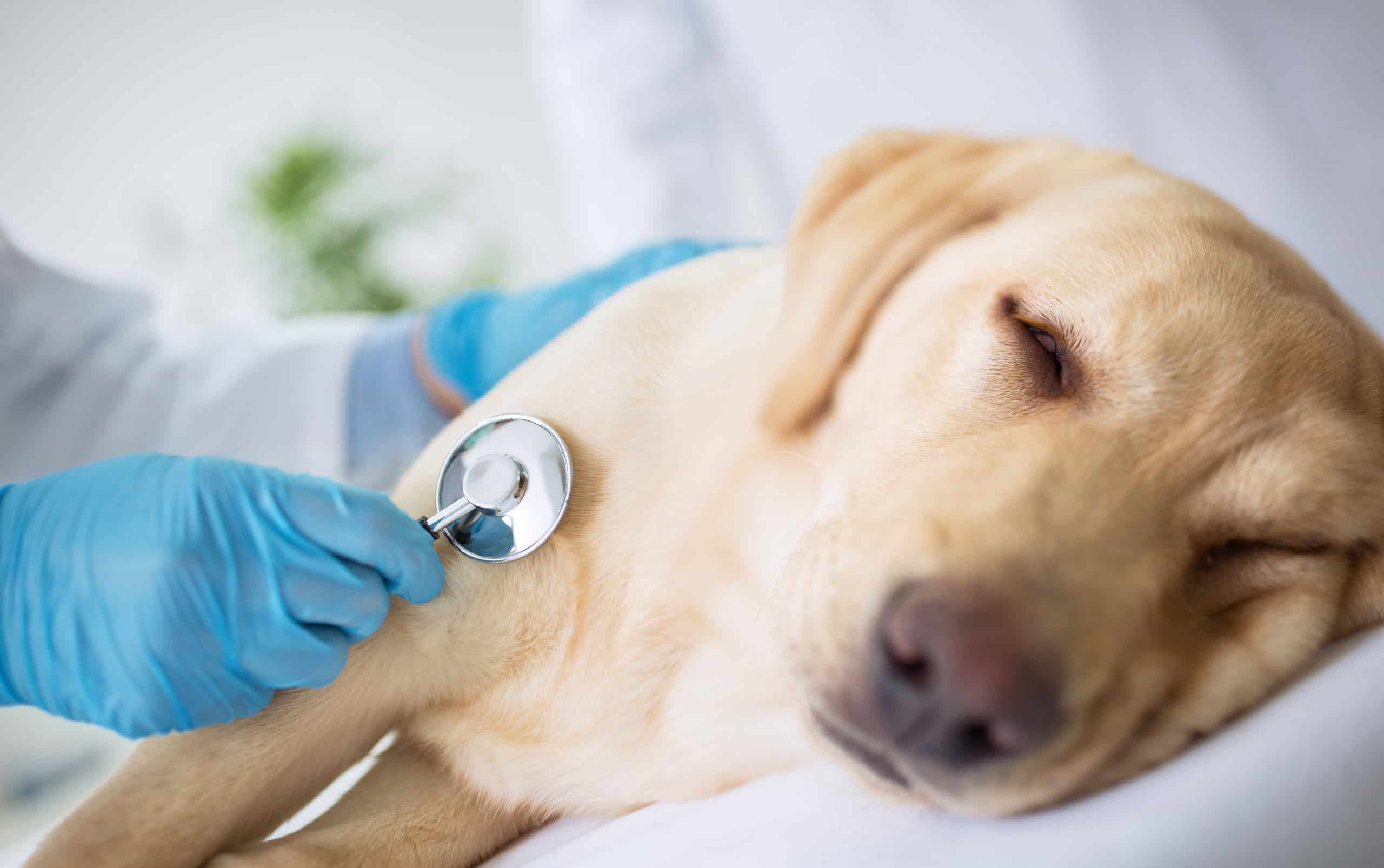
Regular vet visits are crucial to your dog’s health.
©didesign021/Shutterstock.com
It is almost impossible to know when your dog becomes susceptible to an ailment. Nevertheless, there are several things you can do to bolster your dog’s well-being. Be mindful of your dog’s surroundings, train him to imbibe good eating habits, and be consistent with your dog’s medical check-ups.
Summary of 9 Reasons Your Dog Is Retching (Dry Heaving) And What To Do About It
A trip to your vet will always provide the best diagnosis and treatment for your pet.
| Possible Reasons Dog is Retching | |
|---|---|
| 1 | Gastric Dilatation And Volvulus |
| 2 | Blocked Throat |
| 3 | Respiratory Disease |
| 4 | Tumors Obstructing The Airways |
| 5 | Gobbling |
| 6 | Nausea |
| 7 | Bilious Vomit |
| 8 | Loss Of Elasticity Of The Trachea |
| 9 | Tonsillitis |
| 10 | Reflux Gastritis |
The photo featured at the top of this post is © Mumemories/Shutterstock.com
Ready to discover the top 10 cutest dog breeds in the entire world?
How about the fastest dogs, the largest dogs and those that are -- quite frankly -- just the kindest dogs on the planet? Each day, AZ Animals sends out lists just like this to our thousands of email subscribers. And the best part? It's FREE. Join today by entering your email below.
Thank you for reading! Have some feedback for us? Contact the AZ Animals editorial team.







